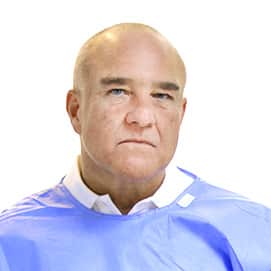Radiation therapy, like surgery, is a local therapy. It can be used alone or in combination with systemic chemotherapy (so-called radiochemotherapy).
By means of ionizing radiation and possibly the simultaneous administration of drugs that inhibit cell division (cytostatics), an attempt is made to stop proliferation, i.e., the division of malignant tumor cells. The degree of effectiveness (radiation sensitivity) of therapy will depend on a number of factors, such as
- cell cycle time (rate of cell reproduction)
- tumor volume
- number of oxygen-poor cells
- the quality of the surrounding tissues
During large clinical studies, it has been proven that the effectiveness of radiotherapy is increased by the additional administration of cytostatics, such as, for example, 5-fluorouracil, cis-/carboplatin, mitomycin, or also taxane-class cytostatics (docetaxel, paclitaxel). At the same time, taking into account the profiles of side effects, these drugs in most cases are combined with radiotherapy 1-2 substances.
Currently, clinical trials of combined radiation and chemotherapy with new drugs are underway. In this case, antibodies are used that are directed against protein substances on the surface of cells, which lead to uncontrolled cell proliferation. The main principle of treatment of tumors with lymphogenous metastasis is the surgical removal of the tumor within healthy tissues, as well as unilateral or bilateral removal of the lymph nodes of the neck, followed by radiochemotherapy.
Head of the Clinic of Oncology, Hematology and Palliative Medicine
Head of the Clinic for General, Visceral, Thoracic and Endocrine Surgery
Head of the Clinic for Radiation Therapy and Radiological Oncology
Video
Request appointment
Useful links
Photo gallery












